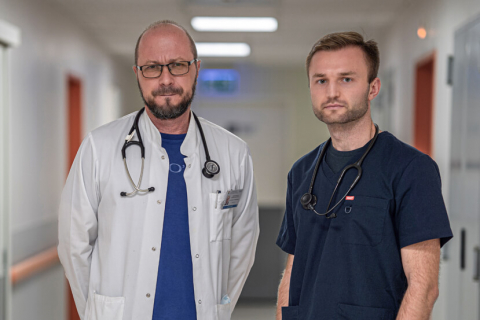The National Science Centre will fund the project. I am pleased that it received the highest marks from reviewers both in Poland and abroad in its category. This confirms our belief that the study may have a significant impact on the treatment of our patients,” says the project supervisor, prof. dr hab. n. med. Piotr Milkiewicz, Head of the Department of Hepatology and Internal Diseases, operating within the Department of General, Transplant and Liver Surgery at the University Clinical Centre of the Medical University of Warsaw.
A mysterious disease of young men
Primary sclerosing cholangitis, often referred to by the English abbreviation PSC, usually occurs in young adults, more often men. The disease is most commonly diagnosed in people aged 25-40 years. It is a rare, chronic condition with incompletely understood causes. Symptoms include pruritus, chronic fatigue and recurrent episodes of cholangitis, often leading to sepsis. Approximately 70% of patients have concurrent inflammatory bowel disease, most commonly ulcerative colitis. - The consequence of PSC can be cirrhosis and the need for an organ transplant. There is also an increased risk of biliary tract cancer. It is a tumour with a very poor prognosis, and it is estimated that the risk of its occurrence after 20 years of PSC is as high as 20% - Prof. Piotr Milkiewicz said. - Our centre is one of several centres in Europe within the ERN (European Reference Network) network for the treatment of rare liver diseases, which specialise in treating diseases with an autoimmune background. We care for a group of over 600 patients with PSC. This is probably the largest group of patients with PSC treated in a single centre among hepatological centres in the European Union countries” - Prof. Piotr Milkiewicz emphasised.
Will the sick finally find help?
Currently, only one product is used to treat PSC. However, this product is ursodeoxycholic acid (UDCA), which cannot effectively halt the disease’s progression in most patients. Researchers from the Warsaw Medical University want to see if another preparation, called S-adenosyl-L-methionine (SAM-e), can benefit patients with PSC.
The deficiency of SAM-e, which is naturally produced in the liver, often accompanies chronic liver disease. So its use is, in a sense, a form of supplementation. Prof. Piotr Milkiewicz has been researching this substance for many years. His first in vitro experiments over a quarter of a century ago, performed in the UK, demonstrated that co-administration of SAM-e and UDCA can improve liver cell function. The results of a project conducted by Prof. Milkiewicz’s team several years ago, investigating the effectiveness of SAM-e in treating patients with another chronic liver disease, were also encouraging. “The findings of this study were encouraging and generated interest, as evidenced by the citation of our work by global experts involved in the treatment of these diseases. Not only have we seen an improvement in liver function tests, but this is very important, a significant improvement in patients’ quality of life. This included a reduction in symptoms of chronic fatigue. This encouraged me to continue my research in a group of patients with a different but somewhat related disease,” - Professor Piotr Milkiewicz said.
Struggle against chronic fatigue
Chronic fatigue occurs in patients with liver disease and other diseases with a likely autoimmune basis, such as lupus erythematosus, rheumatoid arthritis, or multiple sclerosis. - This is a symptom often ignored by doctors,” Prof. Milkiewicz said. - Who is not tired sometimes? Nevertheless, we deal with chronic fatigue, often making it completely impossible to function normally. Unfortunately, we currently do not have any effective treatment for this symptom - Prof. Milkiewicz emphasised. Scientists from the Warsaw Medical University hope that the results of their research will help change this. - I assume that the preparation we are studying will not only improve the liver function of our patients but will also have a positive impact on their quality of life, including a decrease in symptoms of chronic fatigue,” Prof. Piotr Milkiewicz said.
First such clinical trial
The project in question is entitled Clinical Effects and Molecular Mechanisms of S-adenosyl-L-methionine in Patients with Primary Sclerosing Cholangitis. Apart from Prof. Milkiewicz, directly involved in the realisation of the study will be dr Emil Bik, as a student winner of the Wacław Mayzel Medical Laurel awarded by the Polish Academy of Sciences. For dr Bik, the project will be the subject of a doctoral dissertation.
- In our study, we will use a combination of SAM-e with UDCA or UDCA and placebo. This will tell us what effect the product of interest has in patients with PSC. A group of 80 people from our centre will take part in the study - says dr Emil Bik, who adds that the project includes the assessment of clinical symptoms of SAM-e use and a very advanced biochemical and molecular analysis. Thanks to the long-standing collaboration between Prof. Piotr Milkiewicz and Prof. Olivier Barbier of Laval University in Quebec, Canada, this will be possible. Prof. Barbier has unique equipment to research patients with this type of disease. - I am convinced that we will significantly expand our knowledge of the causes of this mysterious disease, - dr Emil Bik said.
Kontakt w sprawie prowadzonych badań:
Prof. Piotr Milkiewicz: piotr.milkiewicz@wum.edu.pl
Lek. Emil Bik: emil.bik@uckwum.pl
Kontakt do Biura Rzecznika Prasowego WUM: media@wum.edu.pl
